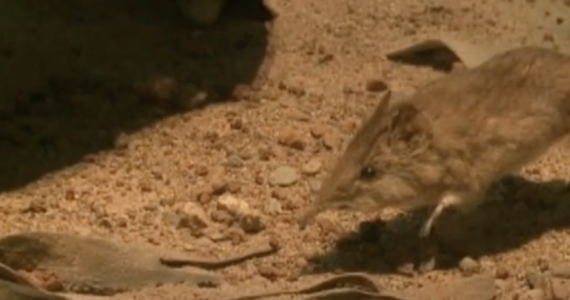The alarming new virus found in Alabama–Could it be the next global outbreak?
By
Michelle E.
- Replies 0
In the quiet woodlands of Alabama, a discovery has been made that could have significant implications for global health.
Scientists have identified a new virus within the local shrew population, and it's raising alarm bells across the scientific community.
This virus, a member of the henipavirus family, is related to some of the most lethal pathogens known to humans, and its emergence in North America is a startling development. Should you be worried?
Henipaviruses, which include the notorious Nipah virus, are no strangers to causing devastation.
Originating from bats, these viruses have been responsible for severe illness and high mortality rates in humans. The Nipah virus, for example, has a staggering fatality rate of up to 70 percent.
Symptoms of henipavirus infections can range from fever and respiratory distress to severe neurological complications such as encephalitis, seizures, and coma. With no specific treatments available, the discovery of a henipavirus in the United States is a cause for concern.

The Camp Hill virus, while never before recorded in humans, is closely related to the Langya virus, which has made the jump from shrews to humans in China.
The Langya virus is known to cause a range of symptoms, including fever, fatigue, cough, muscle aches, and even liver and kidney damage.
The potential for the Camp Hill virus to infect humans cannot be ignored, especially given the precedent set by its relatives.
Researchers first identified the virus in shrews back in 2021, although released the report just this week. This virus is said to not be found in animals other in bats before, nor has it infected humans in the past.
Dr. Rhys Parry from the University of Queensland, who confirmed the virus's presence in Alabama shrews, emphasized that “This indicates that shrew-to-human transmission can occur.”
“The detection of a henipavirus in North America is highly significant, as it suggests these viruses may be more globally distributed than previously thought,” he said.
The northern short-tailed shrew, a common mammal in the woodlands and bogs of Southern Canada and the Eastern and Central US, is now on the radar as a potential carrier of the Camp Hill virus. This overlap between shrew habitats and human populations opens the door to possible animal-to-human transmission, a process known as spillover.
Researchers are urging caution and further study to determine the threat level posed by the Camp Hill virus. They wrote, “Given the high case-fatality rates associated with henipaviruses,’ detection of Camp Hill virus in North America ‘raises concerns about past and potential future spillover events.’”
The virus's presence in shrew kidneys suggests that, should it infect humans, it could target similar organs, leading to serious health implications.
“One of the most dangerous is the Hendra virus, which was first detected in Brisbane, Australia, and has a fatality rate of 70 percent.” said Dr. Parry. “Another example is Nipah virus, which has recorded fatality rates between 40 and 75 percent in outbreaks in Southeast Asia, including in Malaysia and Bangladesh.”
Hendra and Nipah virus can lead to flu and respiratory distress symptoms such as pneumonia. Hendra virus can also cause severe brain and spinal cord inflammation, seizures, confusion, and coma.
Meanwhile, Nipah virus can also cause seizures, brain inflammation, disorientation, confusion, and comatose within a day. As of now, both viruses have no specific treatment.
Source: FOX 11 Los Angeles.
The research team, including co-author Dr. Ariel Isaacs, is now focusing on vaccine development for this family of viruses. Understanding the surface proteins of the virus, which are crucial for cell entry, is the next step in developing effective countermeasures.
Also read: Protect yourself: The alarming new bird flu symptoms you need to know in 2025

Have you been following the news about emerging viruses? What steps do you take to stay healthy in the face of potential outbreaks? Share your thoughts in the comments below!
Scientists have identified a new virus within the local shrew population, and it's raising alarm bells across the scientific community.
This virus, a member of the henipavirus family, is related to some of the most lethal pathogens known to humans, and its emergence in North America is a startling development. Should you be worried?
Henipaviruses, which include the notorious Nipah virus, are no strangers to causing devastation.
Originating from bats, these viruses have been responsible for severe illness and high mortality rates in humans. The Nipah virus, for example, has a staggering fatality rate of up to 70 percent.
Symptoms of henipavirus infections can range from fever and respiratory distress to severe neurological complications such as encephalitis, seizures, and coma. With no specific treatments available, the discovery of a henipavirus in the United States is a cause for concern.

A new virus known as the Camp Hill virus has been discovered in shrews in Alabama, which has raised concerns about the potential for a new pandemic. Image source: FOX 11 Los Angeles / Youtube.
The Camp Hill virus, while never before recorded in humans, is closely related to the Langya virus, which has made the jump from shrews to humans in China.
The Langya virus is known to cause a range of symptoms, including fever, fatigue, cough, muscle aches, and even liver and kidney damage.
The potential for the Camp Hill virus to infect humans cannot be ignored, especially given the precedent set by its relatives.
Researchers first identified the virus in shrews back in 2021, although released the report just this week. This virus is said to not be found in animals other in bats before, nor has it infected humans in the past.
Dr. Rhys Parry from the University of Queensland, who confirmed the virus's presence in Alabama shrews, emphasized that “This indicates that shrew-to-human transmission can occur.”
“The detection of a henipavirus in North America is highly significant, as it suggests these viruses may be more globally distributed than previously thought,” he said.
The northern short-tailed shrew, a common mammal in the woodlands and bogs of Southern Canada and the Eastern and Central US, is now on the radar as a potential carrier of the Camp Hill virus. This overlap between shrew habitats and human populations opens the door to possible animal-to-human transmission, a process known as spillover.
Researchers are urging caution and further study to determine the threat level posed by the Camp Hill virus. They wrote, “Given the high case-fatality rates associated with henipaviruses,’ detection of Camp Hill virus in North America ‘raises concerns about past and potential future spillover events.’”
The virus's presence in shrew kidneys suggests that, should it infect humans, it could target similar organs, leading to serious health implications.
“One of the most dangerous is the Hendra virus, which was first detected in Brisbane, Australia, and has a fatality rate of 70 percent.” said Dr. Parry. “Another example is Nipah virus, which has recorded fatality rates between 40 and 75 percent in outbreaks in Southeast Asia, including in Malaysia and Bangladesh.”
Hendra and Nipah virus can lead to flu and respiratory distress symptoms such as pneumonia. Hendra virus can also cause severe brain and spinal cord inflammation, seizures, confusion, and coma.
Meanwhile, Nipah virus can also cause seizures, brain inflammation, disorientation, confusion, and comatose within a day. As of now, both viruses have no specific treatment.
Source: FOX 11 Los Angeles.
The research team, including co-author Dr. Ariel Isaacs, is now focusing on vaccine development for this family of viruses. Understanding the surface proteins of the virus, which are crucial for cell entry, is the next step in developing effective countermeasures.
Also read: Protect yourself: The alarming new bird flu symptoms you need to know in 2025
Key Takeaways
- A new virus known as the Camp Hill virus has been discovered in shrews in Alabama, which has raised concerns about the potential for a new pandemic.
- The virus is a part of the henipavirus family, which includes the highly lethal Nipah virus, though it has not yet been found in humans.
- Scientists emphasize the significance of this discovery in North America as it suggests henipaviruses may be more widely distributed globally than previously understood.
- There is an urgent need for more research to determine the potential threat of the Camp Hill virus to humans, as well as to develop vaccines and treatments to counteract henipavirus infections.
Have you been following the news about emerging viruses? What steps do you take to stay healthy in the face of potential outbreaks? Share your thoughts in the comments below!






